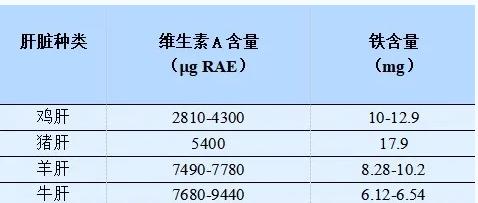Whether animal livers can be eaten, especially as a child's food, has been controversial.
So, can animal liver be given to children?
The answer is yes. Because animal livers are rich in nutrients, contain a lot of vitamin A and iron and other substances, and can be easily purchased and affordable, it has been accepted by most countries.
For example, there is a famous dish in Western food that is foie gras.
How much vitamin A and iron are contained in the livers of different animals?
Let's take a look at the following data:

(Note: The content will vary depending on the animal feeding method, cooking method and other factors, the data is for reference only)
(Data from the USDA U.S. Department of Agriculture website)
In this table, we can see that animal livers are indeed rich in vitamin A and iron.
So, how much vitamin A and iron should a child consume?
Let's first look at the intake of vitamin A by age group:
Children of different ages, the need for vitamin A is different, but there is an upper limit, for example, 4-7 years old children can tolerate the upper limit of 900UL, as long as the child does not exceed this amount, you can.
But foods that contain vitamin A also include meat, eggs, milk, vegetables and other foods. Therefore, for children, in the case of a balanced diet, it is okay to occasionally ingest animal liver, but long-term consumption can easily cause excessive vitamin A production, which will affect the child's bone development.
Having said that, let's talk about iron.
Iron is also one of the substances that children need to ingest as they grow.
Children grow up very fast and have a great need for iron. Iron deficiency will directly affect the growth and development of children, resulting in growth retardation, low immunity, and will also affect the child's personality and intelligence.
Therefore, children should also take appropriate intake of iron.
So how do we carry out iron supplementation under the premise of ensuring that we do not exceed the intake of vitamin A?
Let's first give the group data:
Seafood such as flower nails, oysters and shrimp have an iron content of about 23.8-2.6 mg per 85g, beef has an iron content of about 2.5mg per 85g, chicken has an iron content of about 0.9-1.1mg per 85g, soybeans 0.5 cups of iron content of 4.4mg, spinach 3.2mg. (Data from the U.S. Department of Agriculture)
As can be seen from the above, seafood contains the most iron, followed by soybeans. But what you don't know is that animal livers can contain up to 30.5 UL of iron.
Because animal livers are rich in "heme iron", their iron content is much higher than that of plant foods, and the absorption rate is also high. For example, foie gras often eaten in Western food contains 23.1mg of iron, and pork liver is 22.6mg.
Because, in the process of children's growth and development, in the child's diet balance and health issues, the adaptation of the intake of animal liver is feasible, although there is a risk of vitamin A excess, but as long as it is not a long-term large intake, the risk of causing related symptoms is still relatively low.
Possibly, some people will also ask, the liver is the body's detoxification plant, then will it poison the child?
Of course not.
Detoxification is the decomposition or processing of toxins into harmless substances excreted, not accumulated in the liver, so the liver itself is not toxic, and will not let the child poisoned.
But the liver does contain a lot of heavy metals, such as arsenic, cadmium, lead, mercury, etc., but after investigation, it was found that as long as the environment in which animals live is not contaminated with heavy metals, the liver contains heavy metals similar to meat. So don't worry.
Another point to note is that the cholesterol of the liver is relatively high, and every 100g of pig liver contains 300mg of cholesterol, and excessive intake of cholesterol will increase the risk of coronary heart disease.
But the current study has found that the effect of dietary cholesterol on increasing serum cholesterol is relatively small, unless the amount of cholesterol you consume is very large, that is to say, you eat a lot of each meal every day, under normal circumstances, as long as you pay attention, there is no too obvious impact.
Therefore, for children, eating animal liver 1-2 times a week is basically no problem, but if the child is really unwilling to eat, there is no problem, use other foods containing iron and vitamin A to replace it, do not force it.